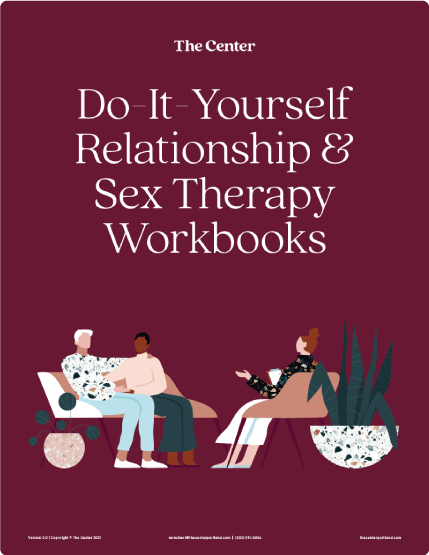Can you recall a specific time where you felt so safe and connected to yourself and the world around you that everything else slipped away? Maybe you were on a walk in a park. Or maybe you were laying in bed with your partner.
You laugh easily, feeling seen, safe, just as you are. That’s what therapy can help recreate inside your relationship: a place of safety, trust, and deep connection.
Although you’d think so from the name, sex therapy isn’t just about sex. In sex therapy, you work to understand your body, your desires, and the ways you connect. And for LGBTQ+ individuals and couples, it can help you navigate both intimacy and the unique stressors you face in our world.
Why LGBTQ+ Therapy Matters
Being LGBTQ+ often means that you carry extra weight around with you. You might face judgment, bias, or feel pressure to conceal parts of yourself. The AAMFT talks about “minority stress”, which is the strain caused from living in a world that often misunderstands your identity.
These pressures can seep into your bedroom. They can make intimacy feel messy or overwhelming.
Sex therapy offers a space where nothing about you is shameful. It helps you untangle what’s yours from what the world has told you. It’s therapy with your whole self in the room, your identities, your stories, your fears, and your strengths.
What The Science Says
Researchers have mapped out the terrain of sexual and relationship issues unique to LGBTQ+ folks. In a comprehensive review, they pointed to concerns like mismatched “outness” (when one partner is more open about their identity than the other), the stress of transitioning, and how drug or alcohol use can affect intimacy.
These are real challenges that don’t show up in heteronormative books. But a skilled therapist knows how to name them and walk beside you in working through them.
Therapy Makes Relationships Stronger
Therapeutic interventions focused on same-sex couples show real gains. A review found that approaches like the Gottman method, behaviorally based therapy, and other structured programs all offered improvements in satisfaction, health behaviors, and relationship quality.
Putting it simply: these therapies work. They help you feel more connected. They help you learn to talk about what’s messy and what’s magical in your love.
What The Center For Couples and Sex Therapy Offers You
Here at The Center for Couples and Sex Therapy, you’re treated as whole. You bring your relationship story. You bring your identity. Whether you live in a same-gender partnership, are exploring kink or ethical non-monogamy, or just want to strengthen communication, it’s all welcome here.
Our therapists are experienced in supporting sexual connection, mismatched desire, navigating kink, or recovering from infidelity or chronic illness.
They don’t ask you to fit a mold. They guide you with empathy and expertise. They meet you where you are, whether the issues are about desire, identity, or how to let pleasure back into your life.
How You Might Feel in a Session
Picture yourself in a softly lit room. There’s warm coffee, or maybe herbal tea. You speak, and someone really listens. You don’t need jargon. You don’t need to explain every acronym. You speak your truth. The therapist holds that truth with care.
Maybe you talk about how one of you is out to friends but not family. Maybe you explore how gender roles feel confusing in your relationship. Or maybe you’re navigating desire when social pressure interferes. These are real stories. They deserve guidance that honors them.
A Glimpse at Techniques That Help
One widely used tool in sex therapy is “sensate focus”, a gentle, non-demanding way to rediscover touch. You might take turns giving and receiving non-sexual touch. No expectation. Just softness. Just presence. Over time, anxiety melts and real intimacy grows. And yes, it works for LGBTQ+ couples too.
Add inclusive, affirmative therapy to that. You see your feelings reflected back, without bias. You build trust with touch. You learn to talk about sex without shame. That’s power.
Is It Worth It?
Sex therapy is worth the time. You learn ways to talk through desire, build new intimacy, and adapt to changes in your lives. It can help if you’ve experienced trauma, mismatched libidos, secrets, or if one of you is transitioning.
You won’t just “solve problems.” You’ll work towards joy and being fully seen. You’ll rebuild pleasure, confidence, and connection, all in a space built with understanding.
For now, work on keeping it simple in your relationship:
- Speak with kindness, not pressure.
- Reconnect with the small, like a gentle touch, or a look that says “I see you.”
- Say out loud what feels hard: “I’m nervous. But I want us to find joy again.”
- Let therapy help you listen, with curiosity and safety.
Therapy helps you reclaim rhythm in your relationship. With guidance, space, and acknowledgment of who you are, you can find intimacy again, on your own terms.
If you’re ready, the therapists at The Center For Couples and Sex Therapy are here, ready when
you are.







